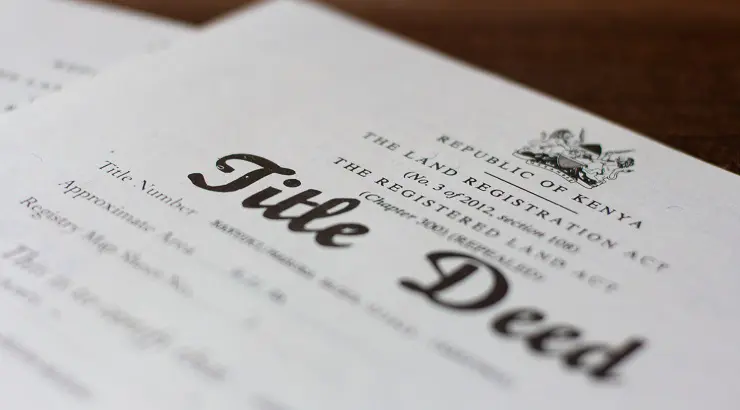Common Mistakes Buyers Make When Purchasing Land in Kenya
Avoid costly land buying mistakes in Kenya. Learn how to verify ownership, spot fraud, understand zoning laws, and protect your investment with a complete buyer’s checklist.
Why Land Purchases in Kenya Require Caution
Overview of Kenya’s Land Market and Investment Potential
Common Mistakes Buyers Make When Purchasing Land in Kenya
Kenya’s land market is one of the most active in East Africa, attracting both local buyers and investors from the diaspora. Understanding the land buying risks in Kenya is crucial because prices can vary widely depending on location, access to infrastructure, and development potential. Many buyers are drawn to opportunities in urban areas like Nairobi, Mombasa, and Kisumu, as well as emerging peri-urban regions.
Key points to consider:
- Rapidly increasing land values in high-demand areas.
- Differences between rural and urban land prices.
- Investment potential for long-term development or resale.
Unique Legal and Regulatory Challenges
Buying land in Kenya involves navigating several legal and regulatory frameworks to avoid land buying mistakes. Land ownership, title verification, and local government approvals are essential steps in any transaction. Many buyers overlook the need for Land Control Board approvals for agricultural land or fail to check zoning requirements for residential or commercial purposes.
Considerations include:
- Verifying the title deed through the Ministry of Lands or eCitizen portal.
- Understanding land zoning regulations and permitted land use.
- Checking for existing encumbrances, inheritance disputes, or pending court cases.

Mistake #1 – Failing to Verify Ownership and Title Deeds
How to Perform a Land Search and Verify Ownership
One of the most common mistakes when buying land in Kenya is failing to verify ownership before making any payment. Performing a land search ensures that the person selling the land is the legitimate owner and that there are no encumbrances or legal disputes attached to the property. Buyers should check the title deed at the Ministry of Lands or through the eCitizen portal. For rural or agricultural land, the Land Control Board must also approve the transaction to confirm that the sale is legal.
Other essential steps include:
- Visiting the local land registry to inspect the original title deed.
- Confirming that the title number matches the land location and boundaries.
- Consulting local authorities, such as chiefs or sub-chiefs, to verify the seller’s legitimacy.
Red Flags in Title Documents
Even if a title deed exists, it may contain hidden risks or discrepancies. Buyers often overlook signs of potential fraud, which can lead to long-term disputes or financial loss. Common red flags include:
- Title deeds that appear altered or photocopied.
- Multiple owners listed without proper inheritance documentation.
- Missing or unclear survey plans, boundary measurements, or approvals.
Checking these details carefully protects buyers from costly mistakes and ensures the transaction is fully legal and secure.

Mistake #2 – Not Hiring Professionals
Importance of a Licensed Lawyer for Land Transactions
Many buyers attempt to save money by handling land purchases without legal assistance. However, hiring a licensed lawyer is critical when buying land in Kenya to avoid land purchase risks. A lawyer reviews contracts, verifies title documents, ensures proper registration, and identifies any disputes or encumbrances that the buyer might miss.
Legal experts also help structure the sale agreement to include clauses that protect the buyer in case of delayed transfers, fraud, or incomplete documentation. This step alone can prevent major financial losses and stress.
Role of Surveyors in Verifying Boundaries and Beacons
Surveyors play a crucial role in ensuring that the land you are buying matches the legal description on the title deed. Many buyers skip this step, which often leads to disputes with neighboring property owners. Surveyors confirm boundary lines, check beacon placements, and produce accurate land maps that match registry records.
Key benefits of using a surveyor:
- Prevents disputes with neighbors over land encroachment.
- Ensures the land area purchased matches what is legally documented.
- Helps buyers understand topography, which can affect construction or agriculture plans.

Mistake #3 – Ignoring Land Location and Infrastructure
Importance of Accessibility, Roads, and Public Transport
One of the biggest land buying mistakes in Kenya is ignoring how accessible the property is. Even if the price seems attractive, land that is far from main roads or public transport hubs can significantly reduce its long-term value. Easy access to roads, proximity to markets, schools, and hospitals not only increases resale value but also makes daily life more convenient.
When evaluating land location, consider:
- Whether the land has a proper road leading to it.
- Distance to the nearest town, public transport, and key amenities.
- Planned infrastructure developments in the area, such as new roads or bridges.
Utilities: Water, Electricity, and Sewer Connections
Another common error is overlooking basic utilities. Land without reliable water supply, electricity, or sewer connections can lead to unexpected costs or delays when developing the property. Even rural land should be checked for access to boreholes, power lines, and drainage systems.
Points to check before buying:
- Availability of water connections or feasibility of digging a borehole.
- Proximity to electricity lines or transformer access.
- Sewer or drainage facilities and potential costs for installation.
Mistake #4 – Overlooking Zoning, Land Use, and Environmental Regulations
Residential, Agricultural, and Commercial Land Distinctions
Understanding land use is critical to avoid costly land purchase risks in Kenya. Buying agricultural land for residential development without proper approval, for example, can lead to legal disputes or denial of construction permits. Similarly, commercial land may have restrictions that limit what businesses can operate there.
Key distinctions:
- Residential land is primarily for homes and may have building height or density limits.
- Agricultural land often requires Land Control Board approval before sale.
- Commercial land has regulations depending on type of business or industry.

Checking County Government and Land Control Board Approvals
Many buyers fail to obtain the necessary approvals before completing a purchase. The Land Control Board (LCB) must authorise transfers for agricultural land, while county governments enforce zoning and building regulations. Skipping this step can render your purchase illegal or delay development.
Steps to follow:
- Confirm LCB approval for agricultural or family-owned land.
- Check with county government for zoning compliance and building permits.
- Ensure all necessary forms and approvals are documented before payment.
Environmental and Topography Considerations (Flood Zones, Riparian Areas)
Environmental factors are often ignored but can affect land usability and future value. Flood-prone areas, riparian zones, or steep terrains can make construction difficult or restricted by law. Environmental assessments help buyers avoid unforeseen risks.
Points to review:
- Check if the land lies in a floodplain or near protected water bodies.
- Assess soil quality and slope for construction suitability.
- Verify any environmental restrictions that may prevent building.

Mistake #5 – Falling for Land Fraud
Common Scams: Double Sales, Fake Titles, and Undeclared Encumbrances
One of the most serious land buying mistakes in Kenya is falling victim to fraud. Scammers often sell the same plot to multiple buyers, forge title deeds, or hide encumbrances such as unpaid loans or claims by third parties. These schemes can result in lengthy legal battles or total loss of money.
Common land fraud examples:
- Double sales: the same plot sold to more than one buyer.
- Fake or forged titles: documents that appear authentic but are counterfeit.
- Undeclared encumbrances: existing mortgages, claims, or inheritance disputes that are not disclosed.
Being aware of these scams is the first step in protecting your investment.
How to Identify Suspicious Deals and Sellers
Detecting red flags before making a purchase is critical to avoid land purchase risks in Kenya. Suspicious deals often involve high-pressure sales, unusually low prices, or sellers who resist proper documentation. Conducting thorough due diligence and consulting professionals helps buyers make informed decisions.
Signs of suspicious deals:
- Sellers who rush payment or avoid written agreements.
- Lack of verifiable documentation or reluctance to provide copies.
- Inconsistent information about the land’s history or boundaries.
Mistake #6 – Ignoring Hidden Costs
Stamp Duty, Legal Fees, Transfer Costs, and Survey Fees
Many buyers focus solely on the purchase price and overlook additional costs. Ignoring these hidden expenses is a common land buying error in Kenya. Proper planning ensures that your budget covers all legal and administrative fees.
Key costs to consider:
- Stamp duty: a government tax based on land value.
- Legal fees: lawyer’s services for contract review and registration.
- Transfer costs: payment for land registration and transfer of ownership.
- Survey fees: fees for surveyors to verify boundaries and produce land maps.
These costs can add significantly to the total investment, so include them in your budget.
Future Costs: Rates, Land Rent, Dispute Resolution
Even after purchase, land ownership in Kenya comes with ongoing or potential costs. Ignoring these can turn a seemingly affordable plot into a financial burden.
Future costs may include:
- Property rates: annual payments to county governments.
- Land rent: for leasehold land, payment to the government.
- Dispute resolution: legal fees if ownership or boundaries are contested.
Planning ahead ensures that you don’t face unexpected financial pressures after the purchase.

Mistake #7 – Not Inspecting the Land Physically
Importance of Visiting the Site
A common land buying mistake in Kenya is relying solely on photos or online descriptions. Physically visiting the land helps buyers confirm its location, condition, and accessibility. On-site inspections also reveal potential issues that documents alone cannot show, such as terrain challenges, soil quality, or environmental concerns.
Visiting the land allows you to:
- Assess accessibility via existing roads.
- Identify nearby amenities like schools, markets, and public transport.
- Check for natural hazards such as flood zones, erosion, or swampy areas.
How to Verify Boundary Markers and Neighbouring Land
Boundary disputes are common when buyers skip proper verification. A licensed surveyor can confirm that the physical markers align with the legal description in the title deed. Additionally, speaking to neighbouring landowners can provide valuable insights about the property, its history, and any potential disputes.
Key steps to ensure accurate boundaries:
- Hire a registered surveyor to map and verify plot corners.
- Confirm that beacons or markers match the registry plan.
- Engage neighbors to check for ongoing disputes or encroachments.
Mistake #8 – Failing to Understand the Seller’s Motivation
Identifying Urgency, Foreclosure, or Distressed Sale Traps
Understanding the seller’s motivation can protect buyers from land purchase risks in Kenya. Sellers in a hurry or under financial pressure may offer “too good to be true” deals, which can be traps. Buyers should carefully assess why the property is being sold and verify that all documentation is complete and legitimate.
Red flags include:
- Sellers pressuring buyers to make immediate payment.
- Unusually low prices compared to similar properties.
- Incomplete or missing documentation.
Negotiating Effectively While Avoiding Pressure Sales
Even if a property seems like a good deal, buyers must negotiate carefully and avoid succumbing to pressure. Understanding standard market rates, comparable property prices, and the seller’s background allows buyers to make informed decisions. A structured negotiation reduces the risk of overpaying or buying land with hidden issues.
Tips for safe negotiation:
- Take your time; never rush a purchase.
- Use a lawyer or professional negotiator for guidance.
- Verify all claims made by the seller with documentation and site inspections.

Mistake #9 – Overpaying or Making Full Payment Too Early
Safe Payment Practices (Escrow, Bank Deposits)
Many buyers fall into land purchase risks in Kenya by paying the full amount upfront without secure mechanisms. Using safe payment channels protects both the buyer and the seller and ensures the transaction is legally documented. Escrow accounts or bank deposits through official channels are recommended, as they provide legal proof of payment and reduce the chance of fraud.
Tips for safe payment:
- Use escrow accounts managed by lawyers or licensed agents.
- Avoid cash transactions unless legally documented.
- Ensure the sale agreement clearly outlines payment terms and conditions.
How to Determine Fair Land Value in Kenya
Overpaying often results from not researching land values in Kenya. Buyers should compare prices of similar plots in the same location, considering size, access to infrastructure, and development potential. Understanding fair market value ensures that investments are sound and reduces the risk of overpayment.
Methods to determine fair value:
- Consult local real estate agents or property valuers.
- Check government land valuation records.
- Compare recent sales of similar plots nearby.
Mistake #10 – Buying Land Without Long-Term Plans
How Land Use, Development Potential, and Resale Value Affect Decision-Making
Buying land without considering its long-term potential is a major land buying error in Kenya. Even if the land seems affordable, failing to evaluate future development or resale prospects can lead to wasted investment. Buyers should consider whether the land can support residential, commercial, or agricultural plans and how its value may change over time.
Factors to consider:
- Suitability for intended construction or farming.
- Future demand for property in the area.
- Potential for infrastructure development that could increase value.
Assessing Future County Development Plans
County governments in Kenya often have development plans that can affect property value. Ignoring these plans is a common mistake. Checking county land use and development plans helps buyers anticipate changes in zoning, infrastructure projects, and urban expansion that can impact the land’s utility and price.
Steps to check plans:
- Visit the county planning office to access development blueprints.
- Review proposed road expansions, water projects, or commercial hubs.
- Factor in environmental conservation zones or protected areas.
Mistake #11 – Overlooking Legal Disputes and Encumbrances
How to Check for Pending Court Cases, Claims, or Inheritance Disputes
Legal disputes are a major land purchase risk in Kenya. Buying land involved in ongoing court cases, inheritance issues, or claims can result in loss of ownership or expensive litigation. Always check for pending disputes at the land registry, local courts, or through the seller’s legal documents.
Steps to protect yourself:
- Request a legal search certificate at the land registry.
- Consult local courts for any ongoing land disputes.
- Ensure that all owners or heirs consent to the sale.
Role of Local Chiefs and Sub-Chiefs in Verifying Authenticity
Local chiefs and sub-chiefs are valuable resources for confirming land authenticity. They often maintain records of land allocation, inheritance, and family transfers in rural areas. Consulting them ensures that the seller has the right to sell and helps uncover hidden disputes or claims.
Key points:
- Chiefs can verify whether the land belongs to the seller.
- They can confirm historical ownership and previous disputes.
- Their verification supports legal due diligence.
How to Avoid These Mistakes – Step-By-Step Checklist
Verification of Ownership, Site Inspection, and Professional Advice
Avoiding mistakes when buying land in Kenya starts with comprehensive verification and professional guidance. Begin by confirming the land’s ownership at the Ministry of Lands or using the eCitizen platform to check the title deed and ensure there are no encumbrances, mortgages, or ongoing legal disputes. Physical inspection of the land is equally important, as it allows you to assess the terrain, access roads, and nearby amenities, which can directly affect the property’s long-term value.
Consulting licensed professionals, such as lawyers and surveyors, is critical. Lawyers review all contracts, ensure legal compliance, and flag any suspicious clauses, while surveyors verify that the physical boundaries match the legal description on the title deed. Combining these steps protects your investment, reduces the risk of fraud, and ensures that your purchase meets all regulatory requirements.
Key actions to follow:
- Verify the title deed and encumbrances through official channels.
- Conduct a detailed on-site inspection of the land, noting terrain, accessibility, and Neighbouring developments.
- Hire a licensed lawyer and surveyor to validate all legal and physical documentation.
Documentation, Legal Compliance, and Secure Payment
Ensuring proper documentation and legal compliance is essential to avoid land purchase risks in Kenya. Before completing a transaction, obtain all necessary approvals, including Land Control Board (LCB) authorisation for agricultural land and county government zoning or building permits for residential or commercial development. Missing these approvals can result in legal complications or even the invalidation of your purchase.
Secure payment methods also play a major role in protecting your investment. Buyers should avoid paying full amounts in cash or transferring money without proper legal backing. Escrow accounts, verified bank deposits, or payment through a lawyer provide a record of the transaction and reduce the risk of fraud. Comprehensive documentation, combined with secure payment practices, ensures that your land acquisition is both legal and safe.
Checklist for compliance:
- Obtain Land Control Board approval if applicable.
- Verify county government zoning and building permits.
- Make all payments through verified, secure channels.
- Maintain copies of all agreements and receipts for legal protection.
Conclusion – Protect Your Investment in Kenyan Land
Recap of the Most Critical Mistakes
Purchasing land in Kenya can be a profitable long-term investment, but only if buyers take the necessary precautions. The most critical mistakes when buying land in Kenya include failing to verify ownership, ignoring the importance of professional advice, overlooking access and infrastructure, neglecting zoning or environmental regulations, falling victim to fraud, and underestimating hidden costs. Each of these mistakes can lead to financial loss, legal disputes, or complications in developing the land.
By understanding these pitfalls, buyers can approach land transactions with confidence. Conducting thorough due diligence, verifying documentation, inspecting the property physically, and consulting professionals are non-negotiable steps that protect your investment. Taking the time to assess these factors upfront saves significant stress and expense later.
Emphasise the Importance of Due Diligence
Due diligence is the cornerstone of safe and profitable land investment in Kenya. Buyers must verify ownership, inspect boundaries and Neighbouring land, check for zoning compliance, and ensure all legal approvals are in place. Understanding the seller’s motivation, future development plans, and potential hidden costs further strengthens your decision-making.
A proactive approach reduces the likelihood of disputes, overpayment, or acquiring land with hidden risks. Following a structured checklist that incorporates legal verification, professional advice, and site inspection ensures that your purchase aligns with your long-term plans. Proper due diligence transforms a potentially risky transaction into a secure investment, giving buyers peace of mind and confidence in their land acquisition.



